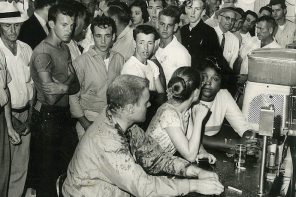It’s been a rough three weeks, and not just for the economy. Despite the new President’s best efforts to change the culture and the tone of Washington, DC, an economic stimulus package (680 pages long) was passed in the US House of Representatives without a single Republican vote. It was a staggering symbolic defeat. And then, an initially more hopeful process to create a leaner bill (431 pages long) in the Senate stalled, despite back-room dealing among Senate centrists from both parties, so that by this weekend, it now seems to be all out partisan warfare.
It is beginning to feel like the script to a play I’ve already seen.
John McCain (R-AZ), pen in hand, makes a mockery of certain provisions he calls “pork.” Strangely, support for honeybees that are dying under mysterious circumstances and in epidemic proportions has provided a major talking point. “Bridges to nowhere” are less problematic, now.
House Minority leader John Boehner (R-OH) frames this as simply the latest skirmish in a never-ending war between tax-cutting Republicans and big-government, big-spending Democrats. Senator Mitch McConnell (R-KY) fired off what is perhaps the most ominous shot yet. Democrats, he warned, have failed to learn from history, since all the big spending associated with Roosevelt’s New Deal “did nothing” for the economy. Unemployment, he suggests, was still at 15% in 1940. No, what got us out of “the doldrums” (his word) was the War.
This one is a puzzler. First, what would unemployment rates have been without the New Deal and Roosevelt’s elaborate system of public works projects? Second, we’ve already got two wars on our hands, and they aren’t helping the economy. In short, 2009 is not 1929. We really are in uncharted territory, as most economists will admit. The lessons of history lie elsewhere.
Now Larry Summers has taken to the round of Sunday talk shows, presenting the President’s (or is it the Democrats’?) case. The sound bytes are simpler. Something must be done, and right away. The economy lost 600,0000 jobs in the last month alone, “as many jobs as exist in the entire state of Maine.” More to the point, the party that stood watch over the last eight years and gave us this imploding economy is in no position to lecture us about it now.
It is a sad day for a presidency that began so optimistically just three weeks ago, amidst a joyous sense of the possibilities for change. The new President himself took a more aggressive stance last week, pressing home the importance of doing something immediately, and responding to criticisms from within his own party that he seemed to care more about bipartisanship than he did about getting the policies right. Here is a crisis of confidence that has quickly become a crisis of faith. President Obama is entitled to his frustration in the face of what must seem increasingly like a Republican scorched-earth policy. And a quote from Marguerite Yourcenar’s masterful 1954 classic, Memoirs of Hadrian, seems eerily relevant:
The evening courier had just informed me that we had re-established ourselves on the heap of tumbled stones which I called Aelia Capitolina and which the Jews still called Jerusalem; we had burned Ascalon, and had been forced to mass executions of rebels in Gaza…. If sixteen years of rule by a price so pacifically inclined were to culminate in the Palestine campaign, then the chances for peace in the world looked dim ahead…. even [among my friends] I had felt irreconcilable differences under that compliance and desire to please, a point where two opposite kinds of thinking meet only to engage in combat.
Hadrian is reflecting here on the horribly destructive Second Jewish Revolt against Rome (in 132-135 CE). And the pagan emperor is mystified by the way religion serves as fuel for such conflict rather than as a mediator.
And that is part of what has been revealed this week: Partisanship is the new American religion.
I encountered a chilling reminder of this just one month ago in Atlanta.
The Campus Crusade for Christ sponsored a four-day conference called “UNVEILED: Unveil Hope Truth and Love to the World.” The gathering was held from December 29, 2008 to January 2, 2009. The evening program on the last day was a marvelously choreographed series of inspirational talks, lectures, music and prayer. But this Christian gathering in the name of “unveiling” hope and reconciling love foundered on—what else?—partisan politics.
The devotional speaker who had been invited to address the 800-plus crowd that evening spoke mainly about the need for Christians to think and act “eschatologically,” orienting their practices always to their vision of ultimate reconciliation which is portrayed as the eschatological banquet of God. Then she used an example to drive the radical nature of Christian reconciliation home to her audience. She was born and raised a Democrat, she confessed, and the notion that she’d be seated at the same eschatological table with Republicans was still a hard pill for her to swallow.
You felt the air sucked out of the room right there in one collective gulp of Christian disbelief. Admittedly, a small handful of women cheered and applauded, clearly because it was the first time in a long time that they’d heard voice given to the possibility of being evangelical and Democratic. But the speaker lost her audience right there, and never got it back.
It is passing strange.
Most Christians are untroubled (and unchallenged) by the Sermon on the Mount’s revolutionary idea that you should “pray for your enemies.” That kind of phrase trips all too lightly off the tongue. And if I were to make a syrupy observation that this means Christians need to pray for Al-Qaeda, then I suspect that most would shrug at the oddity of the idea, but grant that yes, we should pray that they will be brought back into right relation with God. But suggest that a Christian should pray for a Democrat, or that an evangelical Christian might be a Democrat… well, that is an idea best kept veiled. It stretches the bounds of Christian credulity to the breaking point. Democrats are the enemy you dare not pray for, the party you dare not join.
And that’s just where we are. The radical message of Christian reconciliation founders on the shoals of partisan politics.
And make no mistake: This is as true on the left as it is on the right. The hopeful message enunciated just three weeks ago at the presidential inauguration founders on those same shoals. Nothing, it would seem, is stronger than partisanship. No religion can fight it, because it has become the American civil religion.
This, it seems to me, is the terrifying possibility we all must confront now, the reality that has been unveiled in the current battle over the budget stimulus. If the reign of a new prince so bipartisan in demeanor, and so pacifically inclined to the honeybee, culminates in this legislative impasse, then the chances for peace look dim ahead.



